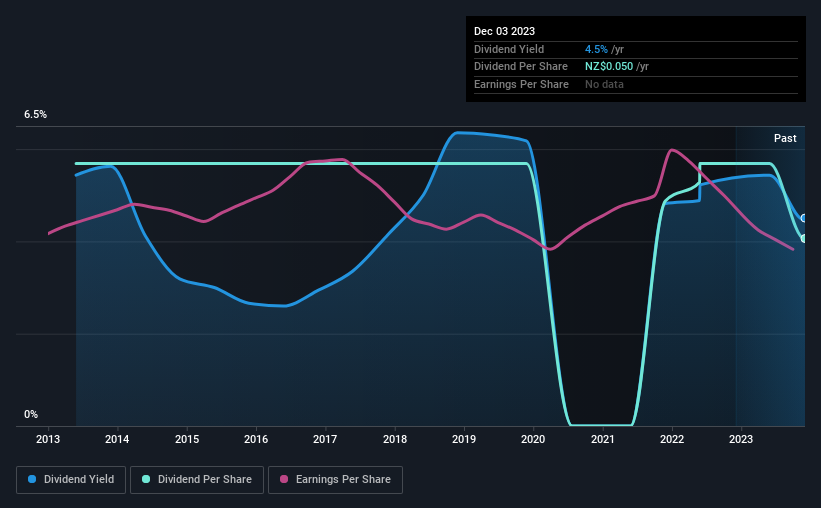Green Cross Health's (NZSE:GXH) Dividend Is Being Reduced To NZ$0.0294
Green Cross Health Limited (NZSE:GXH) has announced that on 20th of December, it will be paying a dividend ofNZ$0.0294, which a reduction from last year's comparable dividend. The dividend yield of 4.5% is still a nice boost to shareholder returns, despite the cut.
See our latest analysis for Green Cross Health
Green Cross Health Is Paying Out More Than It Is Earning
If the payments aren't sustainable, a high yield for a few years won't matter that much. Based on the last payment, Green Cross Health was quite comfortably earning enough to cover the dividend. This indicates that quite a large proportion of earnings is being invested back into the business.
Looking forward, EPS could fall by 2.1% if the company can't turn things around from the last few years. If the dividend continues along the path it has been on recently, the payout ratio in 12 months could be 410%, which is definitely a bit high to be sustainable going forward.
Dividend Volatility
While the company has been paying a dividend for a long time, it has cut the dividend at least once in the last 10 years. Since 2013, the dividend has gone from NZ$0.07 total annually to NZ$0.05. This works out to be a decline of approximately 3.3% per year over that time. Declining dividends isn't generally what we look for as they can indicate that the company is running into some challenges.
Dividend Growth May Be Hard To Achieve
With a relatively unstable dividend, it's even more important to evaluate if earnings per share is growing, which could point to a growing dividend in the future. In the last five years, Green Cross Health's earnings per share has shrunk at approximately 2.1% per annum. A modest decline in earnings isn't great, and it makes it quite unlikely that the dividend will grow in the future unless that trend can be reversed.
Our Thoughts On Green Cross Health's Dividend
Overall, it's not great to see that the dividend has been cut, but this might be explained by the payments being a bit high previously. In the past, the payments have been unstable, but over the short term the dividend could be reliable, with the company generating enough cash to cover it. We would be a touch cautious of relying on this stock primarily for the dividend income.
It's important to note that companies having a consistent dividend policy will generate greater investor confidence than those having an erratic one. Meanwhile, despite the importance of dividend payments, they are not the only factors our readers should know when assessing a company. Taking the debate a bit further, we've identified 3 warning signs for Green Cross Health that investors need to be conscious of moving forward. Is Green Cross Health not quite the opportunity you were looking for? Why not check out our selection of top dividend stocks.
Have feedback on this article? Concerned about the content? Get in touch with us directly. Alternatively, email editorial-team (at) simplywallst.com.
This article by Simply Wall St is general in nature. We provide commentary based on historical data and analyst forecasts only using an unbiased methodology and our articles are not intended to be financial advice. It does not constitute a recommendation to buy or sell any stock, and does not take account of your objectives, or your financial situation. We aim to bring you long-term focused analysis driven by fundamental data. Note that our analysis may not factor in the latest price-sensitive company announcements or qualitative material. Simply Wall St has no position in any stocks mentioned.

 Yahoo Finance
Yahoo Finance 
